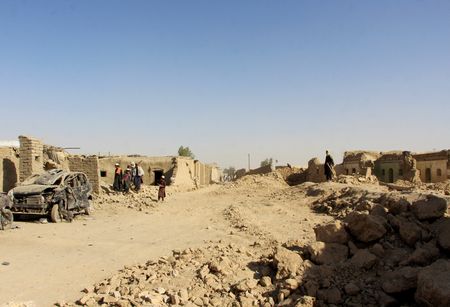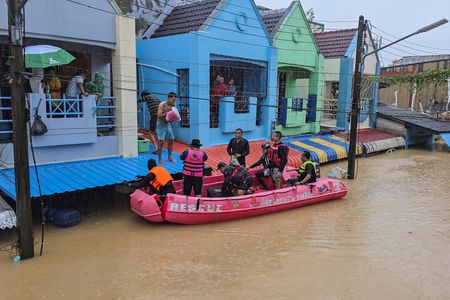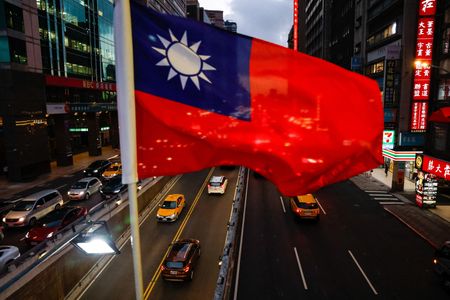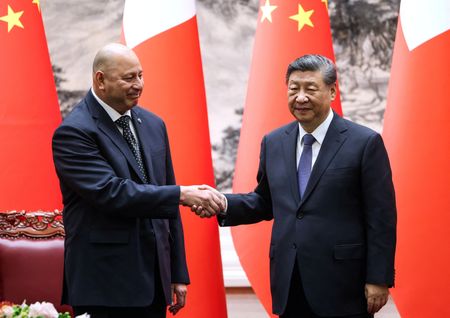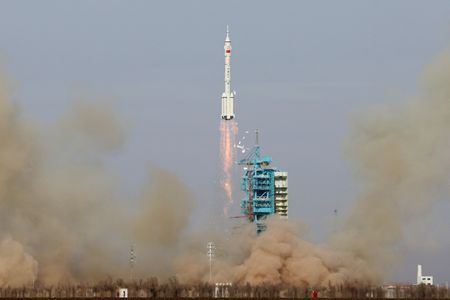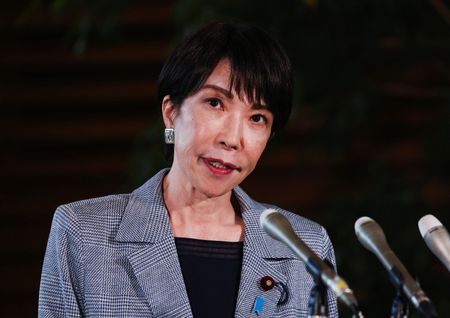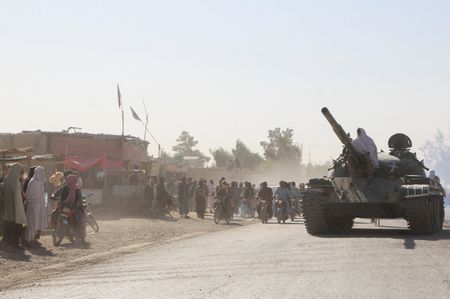By Saeed Shah
ISLAMABAD (Reuters) -Tensions flared between Afghanistan and Pakistan on Tuesday as the Taliban accused Pakistani forces of air strikes in eastern Afghanistan, which killed 9 children and a woman, and injured four others.
There was no immediate comment from Islamabad. The bombardment followed a series of recent attacks in Pakistan, in which Islamabad says the militants came from Afghanistan.
Last month, dozens of people were killed in air strikes and ground fighting between the South Asian neighbours – their deadliest confrontation since the Afghan Taliban seized power in Kabul in 2021.
ACCUSATIONS AND COUNTER-ACCUSATIONS
Islamabad says that Pakistani militants are based in Afghanistan, from where they send attackers into Pakistan.
A suicide bomber killed 12 people in Islamabad this month, the first time civilians had been targeted in the Pakistani capital for a decade. A day previously, another bomber rammed an explosive-laden vehicle into the main gate of a military school in South Waziristan district, near the Afghan border, killing three people.
On Monday, three suicide bombers targeted the headquarters of a Pakistani paramilitary force in the city of Peshawar, killing three personnel and wounding at least five.
The Taliban administration in Afghanistan deny the presence on Pakistani militants there and say that they do not allow Afghan soil to be used against other countries.
WHAT HAPPENED LAST MONTH?
Islamabad says that its patience snapped after an upsurge in attacks by militants in Pakistan that followed the 2021 Taliban takeover in Afghanistan.
Pakistan carried out an air strike on the Afghan capital Kabul in October, which targeted the head of the Pakistani Taliban militant group, according to Pakistani security officials. It is not clear if he survived.
In response, late on Oct 11, Taliban forces attacked Pakistani military posts along the length of the 2,600 km (1,600 miles) border, with Pakistani forces later retaliating. Pakistan said 23 of its soldiers died and the Taliban said nine of its men were killed, though both sides claimed to have inflicted far higher damage on the other.
Both sides signed a ceasefire in Doha in October, but negotiations ended without a long-term deal after Kabul did not provide a written commitment to take action against militants sought by Islamabad. The Afghan Taliban says that it cannot be expected to guarantee security in Pakistan.
WHO ARE THE PAKISTANI TALIBAN?
In 2007, a number of jihadist outfits active in northwest Pakistan from the Pashtun ethnic group formed Tehreek-e-Taliban Pakistan (TTP), which is commonly known as the Pakistani Taliban.
The group was modelled on the Afghan Taliban, an ethnic Pashtun outfit that in the 1990s conquered Afghanistan before being ousted by a U.S.-led invasion in 2001. But the TTP was more radical, taking its ideology from al Qaeda.
Over the next few years, the TTP attacked markets, mosques, airports, military bases, police stations and also gained territory – mostly along the border with Afghanistan, but also deep inside Pakistan, including the Swat Valley, where they later shot schoolgirl Malala Yousafzai.
They also fought alongside the Afghan Taliban in Afghanistan and hosted Afghan fighters in Pakistan, forming a close bond. Pakistan launched a series of military operations against the TTP on its own soil, with limited success.
In recent years, the TTP’s attacks have focused on security forces in Pakistan.
WHAT HAPPENED AFTER THE TALIBAN TOOK AFGHANISTAN?
Pakistan welcomed the return to power of the Taliban in 2021, with then Prime Minister Imran Khan, saying that Afghans had “broken the shackles of slavery”. But Islamabad soon found that the Taliban’s loyalties lay elsewhere.
Islamabad says that the TTP’s leadership and many of its fighters are based in Afghanistan. Pakistan also says that Baloch insurgents, a secular armed movement seeking independence for the western province of Balochistan, also use Afghanistan as a safe haven.
WHY IS PAKISTAN ALSO ACCUSING INDIA?
Islamabad says India, its longstanding adversary, is working with Afghanistan to support the TTP and the Baloch militants against Pakistan. New Delhi denies the claim.
(Reporting by Saeed Shah; Editing by Raju Gopalakrishnan)

